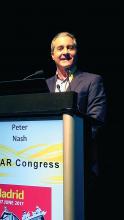MADRID – Aprelimast rapidly improved symptoms for patients with active psoriatic arthritis who were naive to biologics, whether or not they were on background methotrexate.
Response to the phosphodiesterase 4-inhibitor also increased with time, Peter Nash, MD, said at the European Congress of Rheumatology. By 2 weeks, 16% had achieved an ACR20 response. By 24 weeks, that had risen to 43%, and at 52 weeks, was 67%. Many patients responded even better, with 37% achieving an ACR50 response and 21% and ACR70 response by the end of the phase III placebo-controlled trial, said Dr. Nash of the University of Queensland, Brisbane, Australia.
The ACTIVE study was 52 weeks long, and is being followed by an open-label extension. Dr. Nash reported mostly 24-week data, with some preliminary 52-week data for patients who had been on the study drug the entire period.ACTIVE randomized 229 patients with active psoriatic arthritis (PsA) to either placebo or 30 mg apremilast twice daily. The primary endpoint was ACR20 response at week 16. At that time, patients who had not improved by at least 10% were offered early escape into active therapy.
Patients were a mean of 49 years old, with mean disease duration of 4 years. This is considerably shorter than the duration seen in many PsA trials, Dr. Nash said. It was a reflection of the study requirement that patients have taken no more than one synthetic disease-modifying antirheumatic agent (sDMARD) and no biologics for their disease.
The active and placebo groups separated very early in this study, with 16% of the apremilast group achieving an ACR 20 response by 2 weeks compared to 6% taking placebo. The response curves remained significantly separated throughout the entire study. By the 16-week endpoint, 38% of the active group and 20% of the placebo group had achieved ACR20. At this point, 11 of those taking apremilast asked for early escape and went on open-label apremilast at the same dose; 35 taking placebo were switched to open-label apremilast.
By 24 weeks, the ACR20 responses were 44% in the apremilast group and 25% in the placebo group. That response rate continued to rise over the year of treatment. By week 52, 67% of patients who had been on the study drug since the beginning had an ACR20, 37% an ACR50, and 21% an ACR70 response. ACR response was just as good in patients who were taking background methotrexate as those who were not, Dr. Nash said.
Compared to placebo, apremilast was associated with significantly more improvement on the Disease Activity Score-28 (CRP). Again, the response curves separated significantly by 2 weeks (–0.59 apremilast vs. –0.31 placebo) and continued to separate at 16 weeks (–1.07 vs. –0.39), and 24 weeks (–1.26 vs. –0.76). At 52 weeks, among those who had been initially randomized to apremilast, the mean DAS-28 (CRP) score had changed –1.71 from baseline.
The drug also significantly improved enthesitis relative to placebo, with rapid onset of action that continued to improve by week 24. The adverse event profile was good, Dr. Nash said. There were no opportunistic infections and no reactivations of tuberculosis. Ten in the active group and five in the placebo group withdrew due to an adverse event. Diarrhea and headache were the most common issues. Diarrhea occurred in 11% of the placebo group and 15% of the apremilast group; headache in 4% of the placebo group and 7% of the apremilast group. These were more common in the beginning of the study and tended to resolve with time, Dr. Nash said.
Thirty patients in the study had a history of depression and of these, two had a depression flare that lead to withdrawal from the study. Weight loss of at least 10% occurred in 5% of those taking apremilast.
Celgene sponsored the study. Dr. Nash has received research support from the company.
On Twitter @Alz_gal


